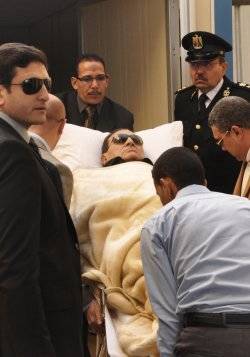The trial of Hosni Mubarak, the deposed Egyptian president, has been adjourned until Wednesday hours after it began, with defense lawyers putting up their arguments saying the former leader was "a victim of malicious accusations".
Farid el-Deeb, Mubarak's chief defense lawyer, portrayed the former Egyptian president on Tuesday as a "clean" leader who placed the law above all else and worked tirelessly for his nation.
"Mubarak is neither a tyrant or a bloodthirsty man. He respects the judiciary and its decisions. A clean man who could say no wrong," el-Deeb said.
Lawyers for Mubarak have been given five sessions to state their case in defense of the former Egyptian president, facing charges of corruption and unlawfully killing protesters during the 18-day uprising that ended his decades-long rule almost one year ago.
Mubarak returned to a Cairo courtroom for the resumption of a trial in which his two sons and eight of his former officials are also accused.
The prosecutor has called for Mubarak to face the death penalty if convicted. Both he and the other 10 defendants have pleaded not guilty to the charges against them.
Chief prosecutor Mustafa Suleiman said at a previous hearing that the ailing 83-year-old must have ordered police to open fire on protesters.
Mubarak "must have agreed on the killings", Suleiman told the court on January 5.
Corruption charges
Mubarak's sons, Gamal and Alaa, also face corruption charges, while Habib al-Adly, a former interior minister and head of security services, is charged with murder and attempted murder.
Six security officials face the same charges. Hussein Salem, a business associate of Mubarak, is charged with corruption.
State television showed the ailing Mubarak lying on a stretcher being wheeled into the Police Academy in northern Cairo for Tuesday's session.
Al Jazeera's Sherine Tadros, reporting from Cairo, said Mubarak's lawyer has one month to try and prove two things.
" First, there were no orders given by any of the defendants to security forces for the killing of protesters," she said.
"Secondly, that Mubarak was unaware of the killings that were taking place, and that’s why he didn’t intervene to stop it."
A judge ruled in August that the case against Mubarak should not be televised.
Defense lawyers have called for hundreds of witnesses to testify in the case, including the head of Egypt's ruling military council, Field Marshal Mohamed Hussein Tantawi, who was Mubarak's defense minister for two decades.
"It's a big task, and what we have seen so far in the previous months in this case is that the prosecution has successfully managed to show that there were protesters killed as a result of live ammunition. They did that by showing autopsy reports to the judges," Al Jazeera's Tadros said.
"Secondly, the live ammunition was fired by police officers.
"Where the prosecution case has faltered is in trying to make that link to Mubarak, his aides and of course, former interior minister Habib al-Adly."
Mubarak is the first Arab head of state to stand trial in person amid a wave of popular uprisings across the Middle East.
His trial opened on August 3, after protesters stepped up demonstrations calling on the ruling military to try him and ex-regime officials.
About 850 people were killed in the uprising against Mubarak which culminated in his resignation from office on February 11, 2011.
PHOTO CAPTION
Former Egyptian president Hosni Mubarak is wheeled into a court house in Cairo, Egypt, Tuesday, Jan. 17, 2012.
Aljazeera


 Home
Home Discover Islam
Discover Islam Quran Recitations
Quran Recitations Lectures
Lectures
 Fatwa
Fatwa Articles
Articles Fiqh
Fiqh E-Books
E-Books Boys & Girls
Boys & Girls  Hajj Rulings
Hajj Rulings Hajj Fatwas
Hajj Fatwas














